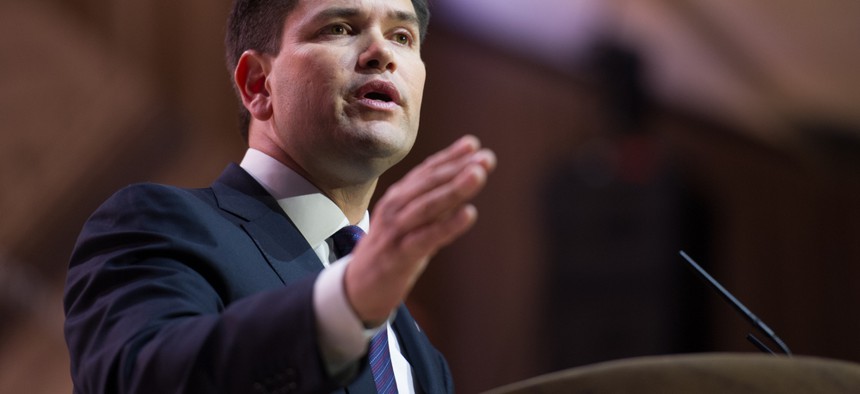
Christopher Halloran / Shutterstock.com
Marco Rubio Wants to Permanently Extend NSA Mass Surveillance
The Florida Republican and likely White House contender is further separating himself from other 2016 hopefuls in the Senate.
Sen. Marco Rubio wants Congress to permanently extend the authorities governing several of the National Security Agency's controversial spying programs, including its mass surveillance of domestic phone records.
The Florida Republican and likely 2016 presidential hopeful penned an op-ed on Tuesday condemning President Obama's counterterrorism policies and warning that the U.S. has not learned the "fundamental lessons of the terrorist attacks of Sept. 11, 2001."
Rubio called on Congress to permanently reauthorize core provisions of the post-9/11 USA Patriot Act, which are due to sunset on June 1 of this year and provide the intelligence community with much of its surveillance power.
"This year, a new Republican majority in both houses of Congress will have to extend current authorities under the Foreign Intelligence Surveillance Act, and I urge my colleagues to consider a permanent extension of the counterterrorism tools our intelligence community relies on to keep the American people safe," Rubio wrote in a Fox News op-ed.
Rubio for years has positioned himself as a vocal defense hawk in Congress, and he has repeatedly defended the NSA's spy programs revealed to the public by former agency contractor Edward Snowden.
But Rubio's call to permanently extend the legal framework that allows the NSA to collect the bulk U.S. phone metadata—language that Congress has tweaked and in many cases made more permissive since 9/11—is particularly forceful. It comes in the wake of terrorist attacks by Islamic extremists in France at a satirical newspaper and a kosher deli that left 17 dead—violence that has prompted European officials to publicly consider whether more forceful surveillance laws are needed.
It also underscores the divisions among Rubio and his fellow Republican senators expected to jockey for the White House—namely, Sens. Ted Cruz of Texas and Rand Paul of Kentucky.
Cruz was one of only four Republicans to join with Democrats in November in voting to pass the USA Freedom Act, a bill that would have reformed several aspects of the NSA spying regime and would have barred the government from dragnet collection of Americans' phone records. Rubio voted against the measure, and so did Paul—though for divergent reasons. While Rubio warned that the bill could hamper intelligence agencies and bolster terrorists, Paul voted it down because he said it did not go far enough.
Paul has vowed to work to block the Patriot Act's reauthorization entirely this year, though many privacy and civil-liberties advocates have questioned the legitimacy of his strategy.
Many supporters of the Patriot Act have said one of the bill's strongest points is that its periodic sunsets force Congress to reconsider the authorities as it strives to balance civil liberties with security.
"I voted for the Patriot Act, but also believed it was very important that there was the expiration of the Patriot Act and the provisions that would ensure that we as members of Congress could analyze it a few years down the road," Rep. Cathy McMorris Rodgers, R-Wash., told attendees at the State of the Net conference Tuesday. "Is this not just what we intended, but is this working effectively?"
Some lawmakers critical of the nation's surveillance programs used Rubio's op-ed to mock his position. Democratic Rep. Jared Polis called for the intelligence community to begin monitoring Rubio 24 hours a day.
"If Senator Rubio believes that millions of innocent Americans should be subject to intrusive and unconstitutional government surveillance, surely he would have no objections to the government monitoring his own actions and conversations," Polis said in a statement Tuesday. "Maybe after his 2016 strategy documents are accidentally caught up in a government data grab, he'll rethink the use of mass surveillance."
Republican Rep. Justin Amash, in reference to this story, tweeted "disqualified." His office would not clarify what the Michigan libertarian meant by the tweet.
Disqualified. RT @nationaljournal: Marco Rubio wants to permanently extend NSA mass surveillance http://t.co/vDfHuK5Jpb
— Justin Amash (@repjustinamash) January 27, 2015Critics of government surveillance, including Snowden, insist that no evidence exists to support the claim that such bulk collection of U.S. phone records help protect national security—and may even distract intelligence agencies from other, more useful intelligence.
Rubio also used the op-ed to suggest that tech companies such as Apple and Google should not create too-tough-to-crack encryption standards on their mobile devices and digital services. Several officials, including Attorney General Eric Holder and FBI Director James Clapper, have warned that so-called unbreakable technology could hamper law enforcement's ability to catch criminals and threaten national security.
"The U.S. government should implore American technology companies to cooperate with authorities so that we can better track terrorist activity and monitor terrorist communications as we face the increasing challenge of homegrown terrorists radicalized by little more than what they see on the Internet," Rubio said.
Rubio's office did not respond to a request for additional comment.
This story has been updated with comments from lawmakers reacting to Sen. Rubio's op-ed.
Brendan Sasso contributed to this article.
(Image via Christopher Halloran / Shutterstock.com )
NEXT STORY: Boehner to Sue Obama Over Immigration







